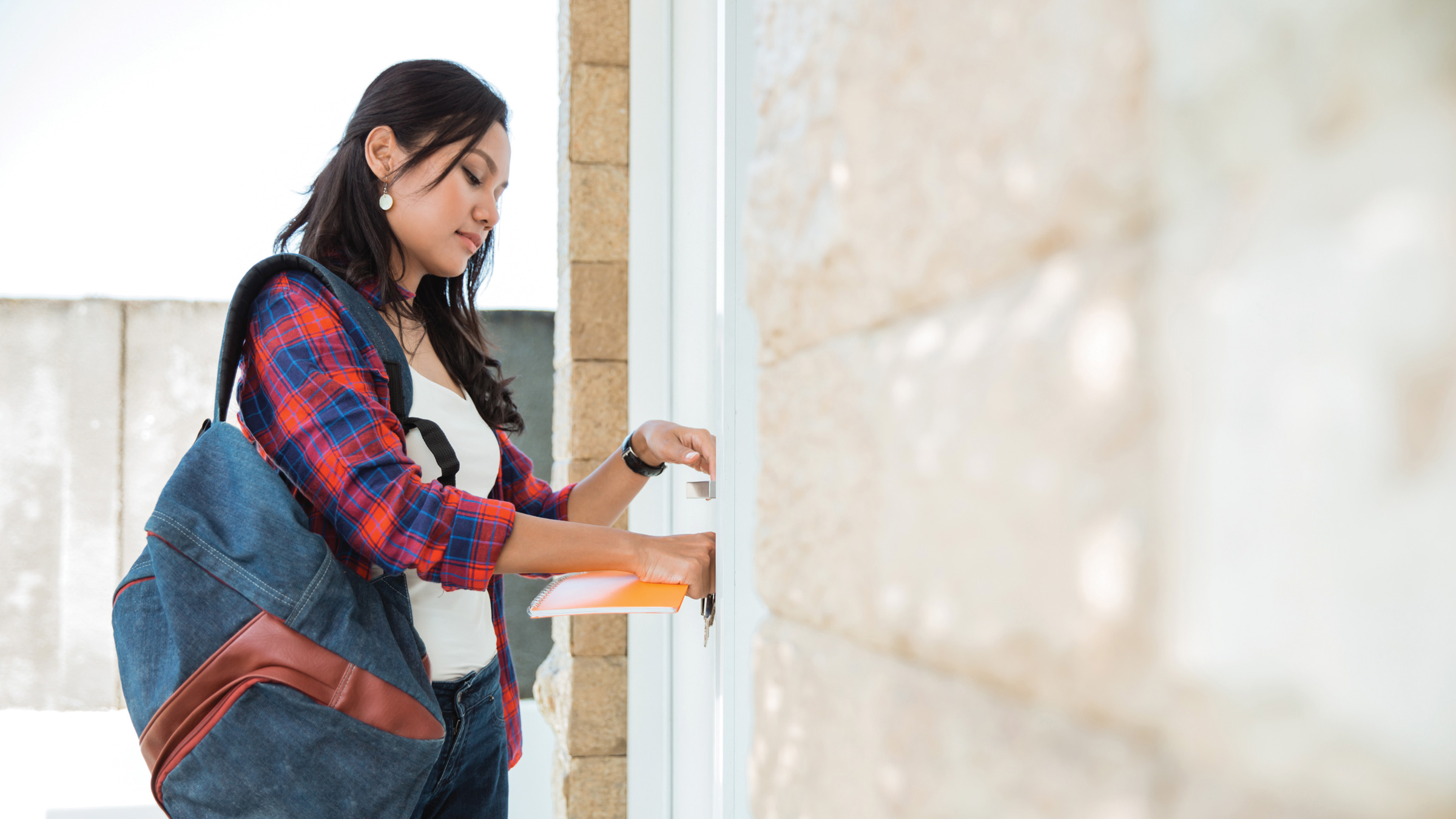
UBC works hard to support student and campus community safety. This effort is strengthened when everyone in the UBC community participates.
Let’s work together to build safe communities in residence. Use these strategies to help keep our residence communities safe—for you and your neighbours.
Residence Safety Strategies
- Lock it up. Each time you leave and when you are sleeping, lock your unit and room door, plus any accessible windows.
- Don’t hold the door for strangers. Please don’t let people follow you into a locked residence building. If they have permission to be there, they will have their own key—or a host.
- Stop before you prop. Never prop open a building door, even if you are stepping outside for just a moment.
- Theft happens. Don’t leave valuables, like your phone, laptop or wallet unattended in a study room, lounge or classroom—or even your unlocked room. Learn more about protecting your valuables. Have a bike? Follow these bicycle security tips.
- Trust your instincts. If you feel like you or another resident is in danger, or if you witness suspicious activity, first call 911, then contact Campus Security (604 822 2222) and your residence Front Desk or the Overnight Mobile Team.
On Campus After Dark
To stay safe when walking on campus after dark:
- Walk with a friend or classmate.
- Ride the Translink Community Shuttle (Route 68), which stops near student residences. Learn more about taking transit on campus.
- Use the AMS Safewalk program—from 8 pm to 2 am (September–April) or 9 pm to 2 am (May–August). Phone Safewalk and a driving or walking team will accompany you to and from campus destinations after dark.
- After 2 am, Campus Security can accompany you across campus. Call 604 822 2222 for assistance.
For more information about your safety on campus, visit UBC Campus Security.
For any crime, it is never the fault of the victim. These preventative measures won’t stop every crime from happening. But by working together proactively, we can all ensure a safer community at UBC.
Emergency Contacts
- Ambulance, Fire and Police: 911
- Campus Security: 604 822 2222
First aid: For non-emergency first aid, contact Campus Security at 604 822 2222.
Additional safety services
Campus Blue Phones
Blue Phones are strategically located throughout campus and offer an immediate connection to Campus Security, if needed.
Campus Security and Police
Both the local police detachment (RCMP) and the UBC Campus Security offices are located on campus—and respond quickly when dispatched.
Sexual Violence Prevention and Response Office (SVPRO)
SVPRO is a confidential place and single point of contact for UBC students, staff and faculty who have experienced, or been impacted by, any form of sexual or gender-based violence, harassment or harm, regardless of where or when it took place.
AEDs and Emergency Naloxone Kits
- Automated External Defibrillators (AEDs) are critical lifesaving devices that can provide a quick response in the event of a cardiac arrest.
- Naloxone is a nasal spray used for the emergency treatment of a known or suspected opioid overdose.
How to access AEDs and emergency naloxone
- In case of emergencies 24/7, call 911.
- During commonsblock open hours, you can also access an AED and nasal naloxone kit mounted to the wall near your Residence Front Desk.
- AEDs are also available in publicly accessible buildings across campus.
Learn more about substance use health and harm reduction for fentanyl and accidental drug poisoning, plus how to prepare for and respond to accidental drug poisoning.
Non-emergency support
Residence Life staff
Living on campus means there’s a support system here to help when you need it. Get an idea of some of the people you can approach with questions, concerns or a request for support—if you get locked out of your room, about mail and parcel pickup, for roommate challenges and more.
Meet the teamTips and Additional Resources
Ways to Protect Your Valuables
Laptops, tablets, smartphones, wallets, purses and personal identification documents can be an easy target for thieves in residence. Keep them safe by securing your room/unit every time you leave, even if it is just for a minute.
- Keep photocopies of all your identification, credit cards, serial numbers—anything that would have to be replaced if your belongings were taken.
- Get insurance to protect your belongings from theft or damage due to an unforeseen cause like a fire or flood. UBC is not responsible for lost, stolen or damaged property. Some students may already be covered under their family’s plan. BCAA is also an option.
- Rent a safety deposit box at a nearby bank to secure valuables such as large amounts of cash.
Bicycle Security
Cycling at UBC is a quick and healthy way to get around campus. Consider these tips for keeping your bike safe from thieves:
- UBC Campus Security recommends using a good quality steel U-lock and heavy cable lock for the front wheel.
- Don’t bring an expensive bike to campus.
- If possible, keep your bike in your room, but not in hallways or common areas due to fire safety regulations.
- Never leave an unlocked bike on a balcony, even if you are above the ground floor.
- Consider leaving your bike at home and using HOPR, the bike share program at UBC instead.
Vehicle Parking
- Do not leave valuables in any vehicle parked on campus.
- All vehicles parked on campus must have insurance.
Online Safety
Your digital identity matters. Digital Tattoo is a great UBC resource for everything from staying safe online and outwitting phishing (and pharming) to understanding how your online activity affects your career or getting tips for effective online research.
Remember that UBC will never send you an email asking for your Campus-Wide Login or password.